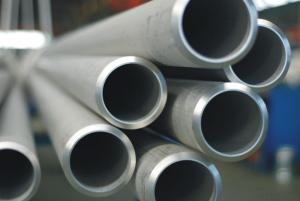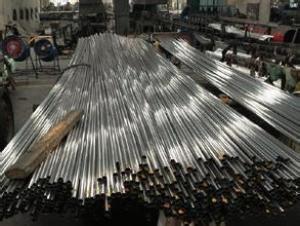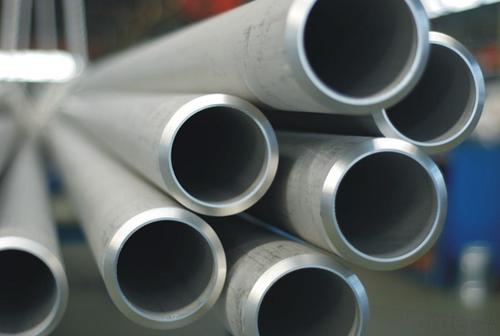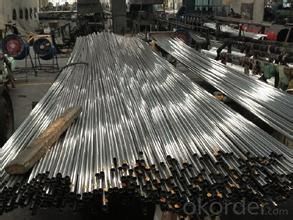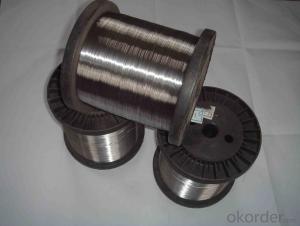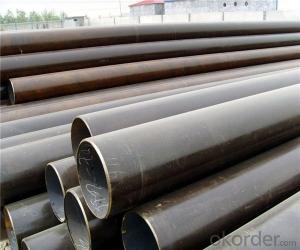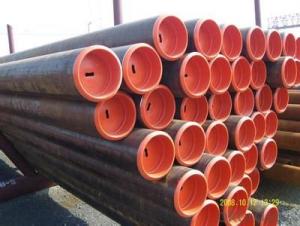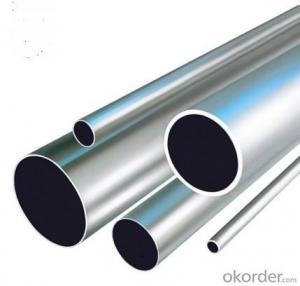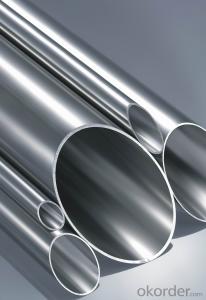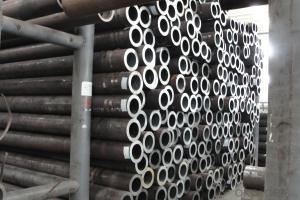Stainless Hot Sale Steel Tube
- Loading Port:
- China Main Port
- Payment Terms:
- TT or LC
- Min Order Qty:
- 30-35 kg
- Supply Capability:
- -
OKorder Service Pledge
OKorder Financial Service
You Might Also Like
Quick Details
| Standard: | JIS,AISI,ASTM,GB,DIN,CE | Place of Origin: | Guangdong China (Mainland) | Brand Name: | QX |
| Model Number: | 201/202/304/316/316L/430 | Type: | Welded | Steel Grade: | 300 Series |
| Application: | Decoration,construction, upholstery | Certification: | ISO | Welding Line Type: | ERW |
| Thickness: | 0.3mm to 3.0mm | Outer Diameter: | 9.53mm to 159mm | Polish: | Satin,Bright or Mirror |
| Grade: | 201,202,301,304,316,316l,430 ect. | Length: | In gernal 5.8m/6m or as customer request | Process method: | Hot rolled |
| Test: | Squash test, water pressure test,extended test,crystal rot test etc. | Production Standard: | ASTM A554 | Materials: | SUS 304, 201, 316, 316L,430 ect |
| OD tolerance: | + / - 0.15mm | Thickness tolerance: | +/- 10% | Length tolerance: | +/- 10mm |
Packaging & Delivery
| Packaging Detail: | Every tube is sleeved in plastic bag individually, and then several tubes are packed by weaving bag, which is seaworthy. Or 50kg/bundle, 500kg/bundle.We can pack as clients' requirement. |
| Delivery Detail: | 25 - 35 days for a full container. |
Specifications
Stainless Steel Pipe:
1.201,202,301,304,316L,430,etc
2.OD:6mm-159mm
3.Thickness:0.25mm-3.5mm
4.Finish:Mirror,Satin,Hairline
Stainless Steel Tube Image

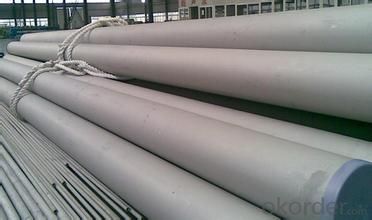
FAQ of Stainless Steel Tube
①How is the quality of your products?
Our products are manufactured strictly according to national and internaional standard, and we take a test
on every pipe before delivered out. If you want see our quality certifications and all kinds of testing report, please just ask us for it.
Guaranteed: If products’ quality don’t accord to discription as we give or the promise before you place order, we promise 100% refund.
②How about price?
Yes, we are factory and be able to give you lowest price below market one, and we have a policy that “ for saving time and absolutely honest business attitude, we quote as lowest as possible for any customer, and discount can be given according to quantity”,if you like bargain and factory price is not low enough as you think, just don’t waste your time.Please trust the quotation we would give you, it is professional one.
③Why should you chose us?
Chose happens because of quality, then price, We can give you both.Additionally, we can also offer professional products inquiry, products knowledge train(for agents), smooth goods delivery, exellent customer solution proposals.Our service formula: good quality+good price+good service=customer’s trust
SGS test is available, customer inspection before shipping is welcome, third party inspection is no problem.
If you have any question, pls feel free to contact us !
- Q: How can the immersed pipe pile put steel cage into the steel pipe? Which expert to answer?
- Immersed tube cast-in-place pile is one of the many types of pile foundations in civil engineering. The immersed tube cast-in-place pile is also called the cast-in-place pile. It is the use of piling equipment, with reinforced concrete pile boots (valve type steel pipe pile shoe) into the soil, pile hole, and then put into the steel skeleton and concrete pouring, then pull out the casing, using vibration extubation of concrete compaction, forming pile needed. Using hammer sinking pile equipment, sinking pipe and pulling pipe pile is called hammer sinking pipe filling pile. It is called vibro sinking pipe cast-in-place pile by vibrator, vibration sinking pipe and pipe pulling pile. In order to improve the quality and carrying capacity of piles, the construction techniques of single shot, double play and reverse insertion are often used in immersed tube cast-in-place piles. Single game (also called a extubation): extubation, every increase of 0.5 ~ 1.0m, 5 ~ 10s vibration, then extubation in 0.5 ~ 1.0m, this is repeated until all pull out; complex play: two singles were continuously in the same pile hole, or according to the needs of the local retapping. Construction, should ensure that two times before and after the immersed tube axis coincide, and in the concrete before the initial coagulation; inverted plug method: steel pipe lifting 0.5m, and then plug 0.3m, so repeated until the pull out.
- Q: How are steel pipes protected against mechanical impact?
- Steel pipes are protected against mechanical impact through the use of various methods such as applying protective coatings, using impact-resistant materials, utilizing proper installation techniques, and implementing impact protection measures like bollards or guards.
- Q: A333gr6 steel pipe and domestic material of the same?
- The SA333 standard in ASME (cryogenic seamless and welded nominal steel tubes), so A333-6 is a representation of the United States, followed by many countries.
- Q: Difference between cold rolled steel pipe and common steel pipe
- 1, from the dimension accuracy above, cold-rolled steel pipe size is good, high precision2. from the outward appearance, the surface of cold-rolled steel pipe is bright, and the surface of hot rolled steel pipe has obvious oxide skin or red rust
- Q: What are the different methods of threading steel pipes?
- There are several methods of threading steel pipes, including manual threading, machine threading, and dielectric threading. Manual threading involves using a manual pipe threader or a handheld die to create the threads on the pipe. Machine threading, on the other hand, utilizes power-driven machines that can thread multiple pipes simultaneously, increasing efficiency and accuracy. Dielectric threading is a specialized method that uses a high-frequency electrical current to generate threads on the pipe, which is commonly used for stainless steel pipes.
- Q: How do you calculate the pipe flow rate coefficient for steel pipes?
- To calculate the pipe flow rate coefficient for steel pipes, you can use the Darcy-Weisbach equation, which takes into account the pipe diameter, length, roughness factor, and the fluid properties such as viscosity and density. By rearranging the equation and solving for the flow rate coefficient, you can determine the value using empirical correlations or by conducting experimental tests under controlled conditions.
- Q: What is the difference between steel pipes and fiberglass pipes?
- The main difference between steel pipes and fiberglass pipes lies in their composition and properties. Steel pipes are made of metal and are known for their strength, durability, and resistance to high temperatures and pressure. They are commonly used in industrial settings and for transporting liquids and gases. On the other hand, fiberglass pipes are made of glass fibers embedded in a resin matrix, providing them with excellent corrosion resistance, lightweight properties, and insulation capabilities. Fiberglass pipes are often used in applications where corrosion is a concern, such as in chemical processing plants or wastewater treatment facilities.
- Q: How are steel pipes used in the food and beverage industry?
- Steel pipes are commonly used in the food and beverage industry for various purposes such as transporting liquids, gases, and solids, as well as for structural support. These pipes are highly durable, corrosion-resistant, and can withstand extreme temperatures, making them ideal for handling food and beverage materials safely and hygienically. They are used in applications like conveying water, oils, and gases, as well as in food processing equipment, brewing systems, and dairy processing plants. Additionally, steel pipes are also utilized for storage tanks, piping systems, and infrastructure in the food and beverage industry.
- Q: How are steel pipes protected against external moisture?
- Steel pipes can be safeguarded against external moisture in various ways. One commonly employed method involves applying a protective coating or paint to the pipe's surface, which acts as a barrier to prevent direct contact with moisture. Depending on the specific requirements and environment, this coating can be composed of different materials like epoxy, polyethylene, or zinc. Another means of protection is through the utilization of corrosion inhibitors. These inhibitors are added to either the internal or external surfaces of the pipes, creating a protective layer that hinders moisture-induced corrosion. Chemicals like rust converters or rust preventatives are examples of corrosion inhibitors that react with the steel, forming a protective barrier. Cathodic protection is an additional technique utilized to shield steel pipes from external moisture. This technique involves the use of sacrificial anodes or impressed current to generate an electric current that safeguards the steel. Sacrificial anodes, typically made of zinc, aluminum, or magnesium, are attached to the steel pipes and corrode over time instead of the steel, thereby preventing moisture-induced corrosion. Moreover, proper insulation and waterproofing measures play a vital role in protecting steel pipes from external moisture. To provide an extra layer of protection and prevent moisture infiltration, insulation materials like foam or tape are applied to the pipes. Waterproofing measures such as sealants or membranes can also be implemented to ensure no moisture seeps into the pipes. Regular maintenance, including inspections and repairs, is crucial for ensuring the continuous protection of steel pipes against external moisture. By promptly addressing any areas of damage or corrosion, the integrity of the protective measures can be maintained, thereby extending the lifespan of the steel pipes and avoiding costly repairs or replacements in the future.
- Q: How are steel pipes used in transportation?
- Steel pipes are commonly used in transportation for various purposes such as the construction of pipelines for oil, gas, and water transportation. They are also used for structural support in bridges, tunnels, and railway tracks. Additionally, steel pipes are utilized in the manufacturing of vehicles, including exhaust systems, chassis, and frames, ensuring durability and reliability in transportation infrastructure.
Send your message to us
Stainless Hot Sale Steel Tube
- Loading Port:
- China Main Port
- Payment Terms:
- TT or LC
- Min Order Qty:
- 30-35 kg
- Supply Capability:
- -
OKorder Service Pledge
OKorder Financial Service
Similar products
Hot products
Hot Searches
Related keywords
